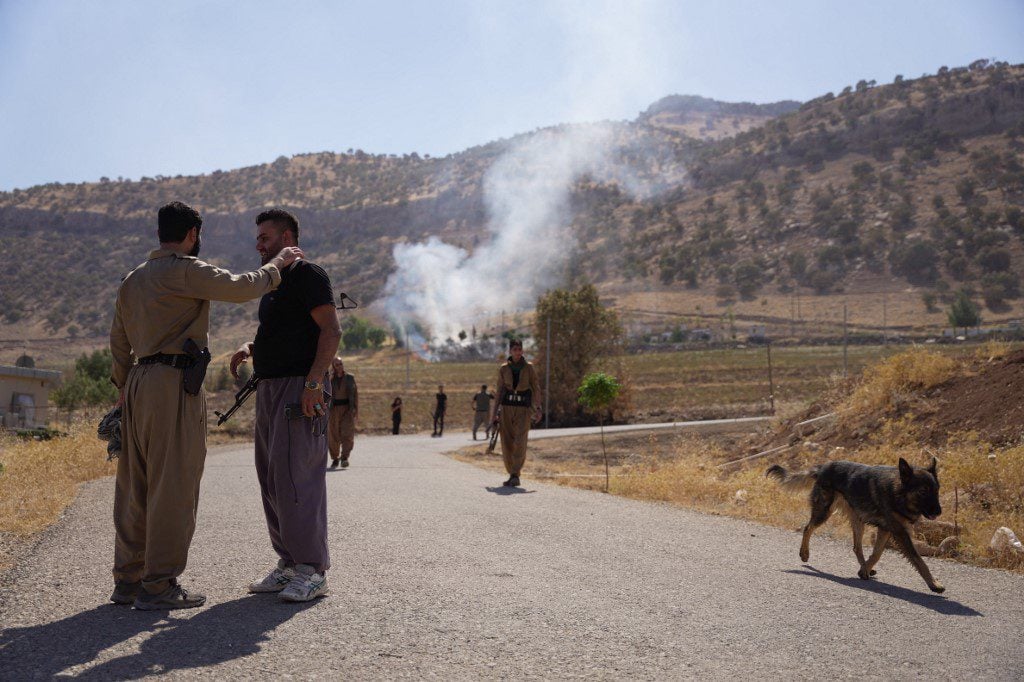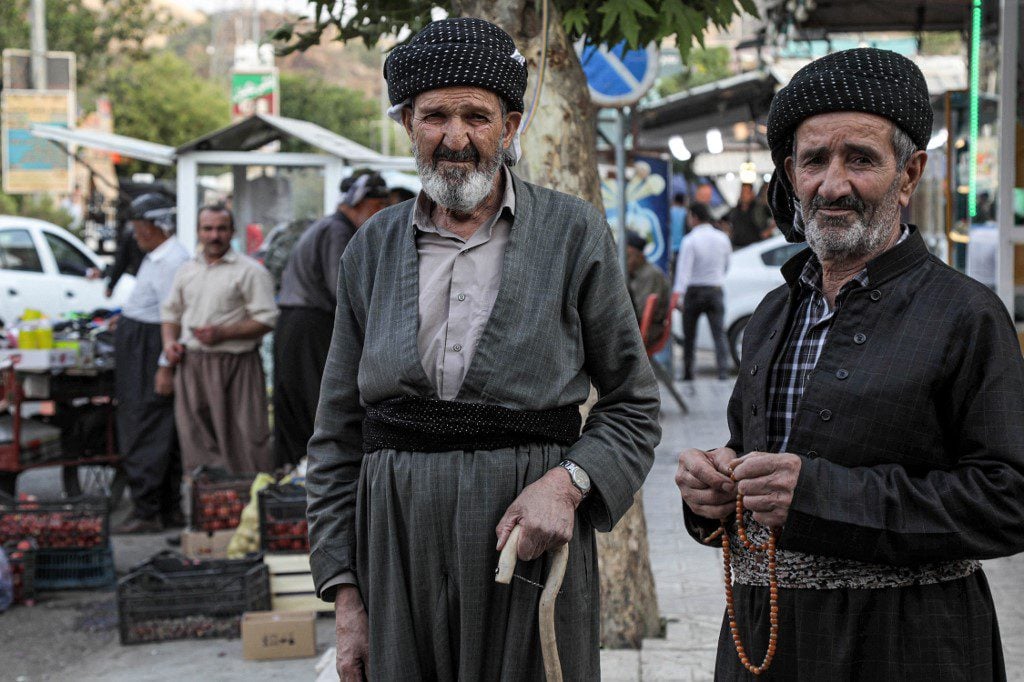The success of Iraqi Kurdistan in terms of safety, economic recovery and services is threatened more than ever by brewing crises.

Hussein Ali Alzoubi
The success of Iraq‘s Kurdistan in terms of safety, economic recovery and services is threatened more than ever by brewing crises. It is a triple threat that permeates Kurdistan. The first concerns the forces at play, the second pertains to the central government in Baghdad, and the third relates to the neighbouring countries.
The last intensified since the Iraqi legislative elections in 2021. However, this crisis reached its peak concurrently with the protests in Iran. Tehran accuses Kurdistan of hosting separatists seeking to destabilise its regime. This coincided with Turkey‘s military campaign against the Kurdistan Workers’ Party (PKK) elements based in the Qandil Mountains in northern Iraq.
The Kurdistan Democratic Party (KDP) and the Patriotic Union of Kurdistan (PUK) have controlled political life in the autonomous region since its establishment in March 1970. In 1991, a no-fly zone was established in the north after the Second Gulf War. With the departure of Iraqi forces from Iraqi Kurdistan in October 1991, the region became de facto autonomous.
However, neither of the Kurdish parties declared independence at the time. The region still considers itself part of the federal state of Iraq and adheres to the Iraqi constitution.
The Federation
The national federation has a federal constitution outlining the foundations for Iraq’s regions. The constitution defines the specialisations, federal powers and authorities of each region. Traditionally, each province has a president, a government and a parliament. The region has the right to a percentage of the natural resources and economic wealth based on its population.
Regional governments are elected under the supervision of the central government and independent bodies. The region may not exchange diplomatic representation, establish an embassy or an organisation of mutual interest without the federal government’s approval.
The most important responsibilities of the federal government are defence, foreign policy and economic policy. It draws up development plans after consultation with regional governments. Additionally, it issues currency and manages banks, the national budget and the budget for each region. Furthermore, it oversees the department of civil affairs, nationality, foreigners, residence and travel. Each local government can legislate how it grants citizenship, provided it does not conflict with the federal constitution.
Iraqi Kurdistan enjoys democratic parliamentary rule, and its regional parliament has 111 seats. Masoud Barzani was the region’s first president, elected at the beginning of 2005 and re-elected in 2009. In June 2019, Nechirvan Barzani, Masoud Barzani’s son, was elected the new president of the three-governorate region, which comprises Erbil, Sulaymaniyah and Duhok.
New Equation

The recent elections and alliances resulted in polarisation and political division that were unprecedented since the fall of Saddam’s regime. This division affected the region’s political forces. The PUK allied itself with the Coordination Framework of Iranian-backed Shiite political powers. In contrast, the KDP aligned with the Sadrist movement and Sunni forces.
The latter coalition drafted the national majority government. According to Iraqi writer Hatem Abdulwahid, this coalition was to pull the rug from under the armed militias by restricting weapons and restoring the state’s authority. Abdulwahid told Fanack that the PUK “chose to partner with Iran’s allies because of historical relations between the party and Iran since Saddam Hussein.”
One of the reasons for the party’s move forward with the Coordination Framework was the Framework’s promise to support the party’s presidential candidate against the KDP’s candidate. The PUK’s choice originates from its historical rivalry with the KDP over obtaining the largest share of the Kurdish bloc at the regional or federal level.
According to Abdulwahid, the alliances collapsed due to pressure from political forces and armed factions on Sadrist allies, exemplified by Iran’s pressure on Muqtada al-Sadr and its bombing of the headquarters of the Sovereignty Alliance and the KDP.
The visits by the commander of the Quds Force, Esmail Qaani, to pressure Sadr coincided with the Islamic Revolutionary Guard Corps’ operation in Erbil relating to the purported presence of Mossad headquarters there. Abdulwahid believes that the actual purpose was to push Masoud Barzani to abandon his alliance with Sadr.
Sadr surprised his allies by announcing the withdrawal of 73 deputies from parliament, forcing the majority coalition into a minority. The Coordination Framework had to give in to form a consensus government. However, the KDP conditioned its participation in this government on solving the problems between Erbil and Baghdad.
Promises of the Coordination Framework Government
The KDP joined the new government coalition after the Framework approved Kurdish demands, most notably freezing the Federal Court’s decision to prevent the Kurdistan region from exporting oil and the Iraqi parliament’s approval of the oil and gas law. The KDP also stipulated that the decision – in accordance with Article 140 of the Iraqi constitution – to remove the Peshmerga from the disputed city of Kirkuk was to be reversed. Furthermore, the party demanded early elections and a fully empowered government.
Dr Hudhaifa al-Mashhadani, a researcher, specialising in Iraqi affairs, ruled out that the Coordination Framework would deliver on its promise. Al-Mashhadani told Fanack, “The Framework will procrastinate in achieving these demands. This procrastination is indicated by choosing to tackle the complex issue of Kirkuk first.”
Article 140 of the 2005 constitution concerns the areas that underwent demographic changes due to the Arabisation policy during Saddam Hussein’s regime. Article 140 provides a three-step mechanism, the first of which is “normalisation,” remedying changes in Kirkuk and disputed areas. The second is conducting a census in those areas. The third is to hold a referendum before 31 December 2007.
Arabs and Turkmen believe the article needs to be amended since the deadline has expired. They accuse Kurdish parties of bringing hundreds of thousands of Kurds to live in these areas to change their demographic identities. On 3 December 2022, Turkmen parties rejected the enforcement of Article 140 while warning of the possibility of a civil war in the disputed province of Kirkuk – between Erbil and Baghdad – if the article were to be enforced.
Eliminating Problems: The Confederation

The KDP‘s recent promises are similar to those made during the formation of previous coalitions. Nouri al-Maliki, former PM and head of the Coordination Framework, used to break his promises once he had obtained the parliamentary votes to form a government. For this reason, Kurdish political forces are pushing to keep their end of the bargain.
Iraqi President Abdul Latif Rashid, a Kurd, called for resolving differences between Erbil and Baghdad. He also called for the creation of a new law for oil and gas that satisfies both parties. Masrour Barzani, Iraqi Kurdistan’s prime minister, pointed out that switching to a confederal system would constitute a new opportunity for a radical solution to all problems. Arafat Karam, in charge of Iraq affairs at the KDP chairman’s headquarters, warned the Shiite Coordination Framework. He made his threat in a tweet that stated, “If the Framework fails to eliminate the problems between Baghdad and Erbil, the confederation would be the most effective solution to end the suffering of the Iraqi peoples.”
The confederation is a dream sought after by many Kurdish politicians. A confederation consists of independent members and sovereign states. It is based on fundamental principles, the most prominent of which is that each Member State has the right to withdraw as an independent state at any time. Members of a federal state do not have this right since they are considered regions and an integral part of the federal state unless otherwise agreed upon in a referendum. One of the most prominent differences between a federation and a confederation is that if a member of a confederation breaches international law, it bears the consequences alone.
Citizens of a confederate state hold different nationalities, whereas there is only one nationality in a federation. There are as many heads of state as there are states in the confederation. A federal state, however, has only one head of state.
North and East Fronts
The unrest in Turkey and Iran affects political life in Iraqi Kurdistan. Combined with the demographic distribution of Kurds in Iran and Turkey, this unrest also impacts the pan-Kurdish identity in both countries, as was evident during the protests in Iran. During an unannounced visit to Baghdad, Esmail Qaani threatened Iraqi politicians with an on-the-ground military operation in northern Iraq unless “Kurdish groups opposed to Iran in northern Iraq are disarmed, and the borders are fortified.”
Abdulwahid believes that the pressure is not directly related to arming Iranian Kurdish parties, something that Erbil denies. He stressed that the pressure is linked to fears that Iraqi Kurdistan would serve as a role model for Kurds in Iran and Turkey. According to Abdulwahid, the region has become a refuge for Iraqi opposition members, especially young Shiites, who posed the greatest threat to the pro-Iranian ruling regime in Baghdad.
According to al-Mashhadani, one of the most important goals of Iran’s pressure is to force the Iraqi army, including the pro-Iranian Popular Mobilization Forces, to fortify the border. Al-Mashhadani believes this path guarantees the presence of armed factions loyal to Tehran’s aspirations at the heart of the Iraqi state.
Turkey’s strikes on the PKK in northern Iraq continue to stress the Kurdish community structure in the region, affecting the region’s stability economically and socially.


